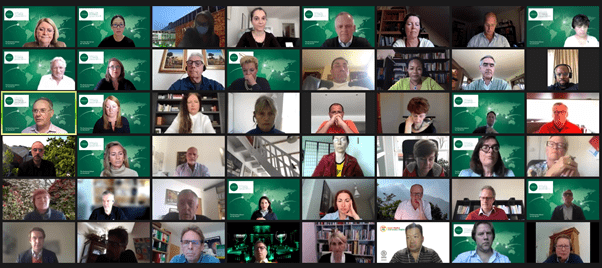What are the current board best practices across different governance situations, different ownership forms and jurisdictions, and different industries and maturity of companies?
By Karen Loon and Pamela Ravasio, IDN Board Members
On 26 April 2021, over 100 INSEAD Directors Network (“IDN”) members had the opportunity to share their international experiences of best practices of hybrid corporate governance in a webinar facilitated by Liselotte Engstam IDP-C and IDN board member.
What were some of the current corporate governance best practices which our global members have observed?
The increasing importance of ESG and sustainability
Sustainability and ESG are increasingly hot topics in the boardroom. It was highlighted that organisations that have so far embraced and succeeded in making good progress in ESG and sustainability have a track record of being more purpose driven. For organisations with a different history and have not been predominantly purpose driven from their inception, it is much harder, and they have to ‘learn’ or even reinvent themselves to make significant progress in this area.
This is a challenge that not only businesses face. Even many NGOs and not-for-profits who have so far fared well focusing on single issues (for example, animal rights and veganism), have to update their ‘raison d’etre’. Adjusting to a world where not single, but complex and multi-dimensions ESG and sustainability challenges need addressing is something novel for many of them.
It can hence be said that, for organisations, the process towards embracing and embedding ESG and sustainability needs to be viewed as part of change management and culture change exercises, as it will have significant implications on new business, reporting, disclosure and future success, none of which can easily be templated.
Associated with this, some believe that ESG and sustainability discussions at the board level are taking place at a relatively high level (30,000 feet level) and have concerns that there may be a disconnect between board discussions and what is happening at the ground level. It has been pointed out that best practice board members are visiting facilities or possibly even have independent conversations with on-the-ground members of their network to ensure they understand what sustainability means at the working level, and to feel the organisation’s temperature.
Luckily it becomes also increasingly common for ESG dashboards to be used within organisations. Such tools, assuming that appropriate and relevant metrics are being used, allow for a quick change of altitude and effective deep dives if and where required.
The evolving role of the board and the chair
In an environment where regulators, the investment community, and stakeholders are focused on the purpose and strategy of companies and board performance, directors need to become increasingly curious and ensure that they have the right lenses on the future of their organisations.
In a hybrid corporate governance environment, the role of the chair is essential to invigorate open discussions, create safe spaces and ensure that the board has sufficient time to reflect. The chair also needs to ensure that he/she doesn’t “broadcast” and that boards operating virtually do not compromise on the quality of debate, become too tunnel-visioned and functional, and have short-sighted discussions.
Board meetings are getting shorter; however, there may need to be more discussions on important topics such as innovation, some of which may need to be away from the board room.
Finally, with an increase in the number of start-up boards, boards and their directors are focusing on best practices in pulling together start-up boards, finding the right directors, and professionalising them.
Board composition – Bringing new perspectives into the board room
With new pressures on companies and their directors requiring them to bring new perspectives into the board room, most boards have been looking at how they can find the right talent. Expectations on nominating committees to increase the value that they add to their organisations are rising.
In line with increasing recognition that not all expertise needs to be on the board, many companies have established advisory boards to advise management, which allows for talent gaps to be filled more quickly and supplement internal resources. Some are including people with innovation, digital and ESG expertise on these boards.
Boards are also looking for directors to bring more contrarian views. Examples include having younger voices in the boardroom, obtaining employee points of view (to understand well-being and resilience) and inviting customers to speak to boards. The composition of the board needs should take into consideration the need for generational and other diverse views, as well as experience. Others are looking for expertise beyond their borders. For example, some of the leading practices concerning digital are from Asia (specifically China) and Africa.
Improving board effectiveness
In line with the need for boards to be more agile, more established boards are doing evaluations and gap analyses, which are essential given the speed of change and the need to quickly assess whether boards need new talent. These are formal and informal, take place more frequently, and look at what to start, stop and continue, moving beyond a checklist approach.
Over the past 18 months, most boards have become more digitally savvy. However, some highlighted that having one or two board members with digital experience doesn’t translate to the whole board collaborating well using technology. It is taking time for most boards to learn how to best use technology in the boardroom, with some needing to accelerate their progress in this area. One tool that some boards are exploring is the use of electronic signatures.
IDN’s next webinar on Successful Family Business Boards – Best Practice Discussions will be held on Monday, 17 May 2021.
INSEAD Directors Network (“IDN”) – An INSEAD Global Club of International Board Directors
Our Mission is to foster excellent Corporate Governance through networking, communication and self-improvement. IDN has 1,500 members from 80 countries, all Alumni from different INSEAD graduations as MBA, EMBA, GEMBA, and IDP-C. We meet in live IDN webinars and meet-ups arranged by our IDN Ambassadors based in 25 countries. Our IDN website holds valuable corporate governance knowledge in our IDN blog, and we share insights also to our LinkedIn and Twitter followers. We highlight our member through quarterly sharing of their new board appointments, and once a year we give out IDN Awards to prominent board accomplishments. We provide a peer-to-peer mentoring and board vacancy service and we come together two times per year at the INSEAD Directors Forum arranged by ICGC. We also engage with ICGC on joint research.
INSEAD Corporate Governance Centre (“ICGC”)
Established in 2010, the INSEAD Corporate Governance Centre (ICGC) has been actively engaged in making a distinctive contribution to the knowledge and practice of corporate governance. The ICGC harnesses faculty expertise across multiple disciplines to teach and research on the challenges of boards of directors in an international context and to foster a global dialogue on governance issues with the ultimate goal to develop boards for high-performance governance. Visit ICGC website: https://www.insead.edu/centres/corporate-governance




